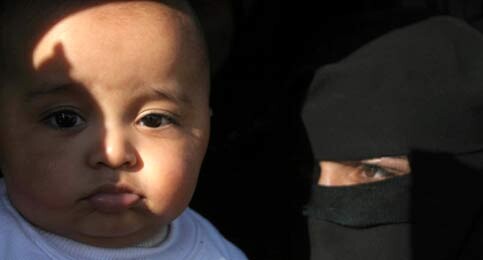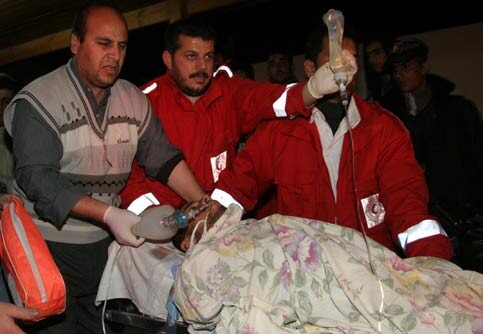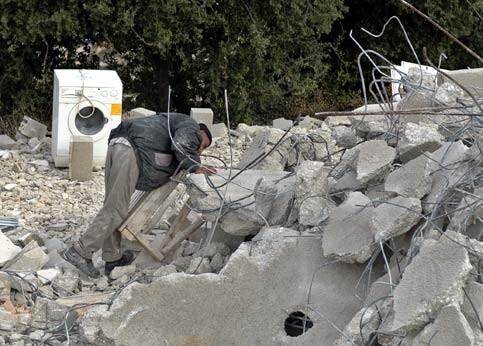Palestinian Center for Human Rights 14 December 2006

Palestinian mother carries her son near Rafah crossing in the southern Gaza Strip, December 14, 2006. (MaanImages/Hatem Omar)
Israeli Occupation Forces (IOF) Continue Systematic Attacks on Palestinian Civilians and Property in the Occupied Palestinian Territory (OPT)
Summary
Israeli violations of international law and humanitarian law continued in the OPT during the reported period (7 - 13 December 2006):
Killing: During the reported period, a Palestinian couple were killed in Sa’ir village, northeast of Hebron, and their child was seriously wounded on 9 December 2006, when a mysterious object exploded in junks collected by the husband from an area used by IOF as a training site. On 12 December 2006, a 56-year-old Palestinian woman died from a heart attack when IOF detonated a sound bombs inside her house. On 10 December 2006, a Palestinian child was wounded in al-Fara’a refugee camp, southeast of Jenin, when IOF fired at a number of children who demonstrated against them.
In the Gaza Strip, in violation of the truce between IOF and the Palestinian side, IOF fired at a number of Palestinian civilians, wounding 10 of them. On 7 December 2006, 4 Palestinian civilians, including two brothers, were wounded in separate incidents of shooting by IOF in the northern Gaza Strip. On 8 December 2006, two Palestinian civilians, including a child, were wounded when IOF fired at a number of Palestinian civilians who were searching for wires and metals in the northern Gaza Strip. On 10 December 2006, IOF fired at a Palestinian civilian who was farming his land in the northern Gaza Strip, wounding him seriously. On 13 December 2006, an IOF gunboat opened fire at a fishing boat opposite to Rafah seashore, wounding 3 Palestinian fishermen, including two brothers.

Palestinian doctors trying to save wounded Palestinian fishermen after they were shot by Israeli boats in Rafah in the southern Gaza Strip, December 13, 2006. (MaanImages/Hatem Omar)
Incursions: During the reported period, IOF conducted at least 27 military incursions into Palestinian communities in the West Bank, during which they raided houses and arrested 40 Palestinian civilians, including 6 children. They also raided and searched offices of two local radio stations in Hebron, and arrested the director of one of them.
Restrictions on Movement: IOF have continued to impose a tightened siege on the OPT and imposed severe restrictions on the movement of Palestinian civilians in the Gaza Strip and the West Bank, including Occupied East Jerusalem.
Gaza Strip
IOF have imposed a strict siege on the Gaza Strip. They have closed its border crossings as a form of collective punishment against Palestinian civilians.
IOF have closed Rafah International Crossing Point since 25 June 2006, even though they do not directly control it. During the reported period, the crossing point was reopened on Wednesday, 13 December 2006. IOF have partially reopened commercial crossings, especially al-Mentar (Karni) crossing, but many goods and medical supplies have been lacked in markets in the Gaza Strip. IOF have also continued to close Erez crossing in the northern Gaza Strip. Hundreds of thousands of Palestinians from the Gaza Strip have been prevented from traveling through this crossing. IOF have allowed international workers to pass through the crossing. With this closure, only few Palestinian patients have been able to travel to hospitals in Israel and the West Bank. In addition, IOF have continued to prevent Palestinian fishermen from fishing for 5 months.
West Bank
IOF have tightened the siege imposed on Palestinian communities in the West Bank. They have isolated Jerusalem from the rest of the West Bank. IOF positioned at various checkpoints in the West Bank have continued to impose severe restrictions on the movement of Palestinian civilians. IOF have continued to separate between the north and south of the West Bank.

Palestinians inspect the rubble of their house after the Israeli army demolished it in the West Bank village of Al-Walajah near Bethlehem, December 12, 2006. (MaanImages/Fadi Tanas)
Annexation Wall: IOF have continued to construct the Annexation Wall inside the West Bank. During the reported period, IOF continued to construct a section of the Wall near ‘Azzoun ‘Atma village, south of Qalqilya. IOF seized more Palestinian land for this purpose. This section of the Wall will isolated the village totally and will seal it off from large areas of agricultural land and some houses and civilian facilities. On 12 December 2006, IOF soldiers prevented Palestinian school children teachers from reaching their school in ‘Azzoun ‘Atma village, south of Qalqilya, which has been isolated by the Wall. On 7 December 2006, IOF used force to disperse a peaceful demonstration organized by Palestinian civilians and international and Israeli solidarity activists in protest to the construction of the Wall in Bal’ein village, west of Ramallah.
The outcome of crimes committed by IOF since 25 June 2006:
Israeli Violations Documented during the Reporting Period (7 - 13 December 2006)
1. Incursions into Palestinian Areas and Attacks on Palestinian Civilians and Property in the West Bank and the Gaza Strip
Thursday, 7 December 2006
1. Ma’moun Qassem Jaber, 24;
2. Rami ‘Othman al-Far, 25; and
3. Eyad ‘Adnan al-Far, 24.
Friday, 8 December 2006
1. Mohammed Jamal Barakat, 20, from al-Zaytoun neighborhood in Gaza City, seriously wounded by a live bullet to the chest; and
2. ‘Aadel Jamal al-‘Attar, 17, from Beit Lahia, wounded by a live bullet to the right foot.
1. ‘Aahed Ghassan al-Ka’bi, 17; and
2. Ahmed Bilal Shnaiweer, 16.
Saturday, 9 December 2006
Sunday, 10 December 2006
Monday, 11 December 2006
1. Ra’ed Shaher al-Atrash, 23; and
2. Wissam Din al-Qudsi, 19.
Tuesday, 12 December 2006
1. Nahel ‘Arafat, 28;
2. ‘Ammar ‘Arafat, 26;
3. Hamza ‘Ammar Kharma, 21;
4. Khaled ‘Ammar Kharma, 23; and
5. Ra’ed Mohammed Jadallah, 25.
During house raids, IOF soldiers harassed the family of Marwan Rasheed ‘Abda, 43, in al-Makhfiya neighborhood in the south of Nablus. An IOF bloodhound attacked ‘Abda’s wife, 33-year-old Nidaa’ Yousef Shahrouri. In her testimony to PCHR, Shahrouri said:
“At approximately 04:50 on Tuesday, 12 December 2006, we woke up hearing sounds of megaphones behind our house in al-Makhfiya neighborhood, calling on residents of the area to get out of houses. Sound bombs were also detonated behind our house. We got out of the house. An IOF soldier ordered my husband to raise his hands, and he, I and our children did. IOF soldiers checked my husband and verified his identity card. They ordered me and my children to sit near a wall. They then ordered my husband to go towards a military vehicle that stopped near our house and he did. Nearly 20 minutes later, I saw my husband coming back. When he was close to another military vehicle, I heard IOF soldiers ordering him through a megaphones to enter the house and open doors, and he did. Soon, an IOF military vehicle stopped near the door. A number of IOF soldiers, accompanied by a muzzled bloodhound, broke into the house. An IOF soldier removed the muzzle from the bloodhound’s mouth. Soon, the bloodhound got out of the house and ran towards me. It bit me to the side and the hand. I screamed and ran towards an IOF military vehicle. I asked IOF soldiers to intervene, but they did not respond immediately. A few minutes later, an IOF solider moved towards the bloodhound and ordered it to move away. The soldier ordered me to sit. I was bleeding, and I asked him to call for an ambulance. He told me that he would bring a doctor. A few minutes later, 3 IOF soldiers came to me and ordered me to go with them. They took me nearly 20 meters away from the house. One of the soldiers told me that he is a doctor and asked me where the bloodhound bit me. He provided me with first medical aid. Five minutes later, a Palestinian ambulance arrived at the area. I walked towards it, and it evacuated me to Rafidya Hospital where I received medical treatment.”
1. Ahmed Mahmoud ‘Omran, 22;
2. Mohammed Rasheed Radwan, 18; and
3. Murad Saqer Saleem, 17.
Wednesday, 13 December 2006
1. Hasan Sabri Bader, 16; and
2. Atheer Mahmoud ‘Olayan, 14.
1. Hamdan Mohammed Brahoum, 24, seriously wounded by shrapnel throughout the body;
2. Sa’id Khalil al-Bardawil, 34, seriously wounded by shrapnel to the face; and
3. ‘Adnan Khalil al-Bardawil, 46, wounded by shrapnel throughout the body.
Two Palestinians Civilians Killed by the Explosion of a Suspicious Object of the IOF’s Remainders
On Saturday morning, 9 December 2006, a Palestinian civilian and his wife were killed and their son was wounded when a mysterious object from the remainders of IOF exploded in Sa’ir village, northeast of Hebron.
According to investigations conducted by PCHR, at approximately 10:00 on the aforementioned day, Kamel Fayez Te’ma al-Mutawar, 45, his wife Hikmant Mohammed Te’ma al-Mutawar, 40, and their son Sanad, 17, were near their house in Sa’ir village, northeast of Hebron, checking junk from the remainders of IOF, which they had brought from the east of the village. A heavy explosion occurred in the junk, killing the man and his wife and seriously wounding their son. According to medical sources, the man was hit to the head whereas his wife was hit to the head and the back. According to eyewitnesses, the victims used to collect junks from areas located to the east of Bani Na’im and Sa’ir villages to retreat and sell them. According to Palestinian security sources, the explosion resulted from an artillery shell from the remainders of IOF.
2. Continued Siege on the OPT
IOF have continued to impose a tightened siege on the OPT and imposed severe restrictions on the movement of Palestinian civilians in the Gaza Strip and the West Bank, including Occupied East Jerusalem.
Gaza Strip
IOF have continued to close all border crossings of the Gaza Strip. During the reported period, these crossings were partially reopened to allow the entry of basic foodstuffs, medical supplies and other necessities into the Gaza Strip. The total siege imposed by IOF on the Gaza Strip has left disastrous impacts on the humanitarian situation and has violated the economic and social rights of the Palestinian civilian population, particularly the rights to appropriate living conditions, health and education. It has also paralyzed most economic sectors. Furthermore, severe restrictions have been imposed on the movement of the Palestinian civilian population.
On 15 November 2006, the Palestinian - Israeli agreement on border crossing, which was concluded under US and European supervision, expired. Under this agreement, IOF have maintained indirect control over of the crossing point. The European observation team working at the crossing point extended their task for additional 6 months. On 15 November 2005, the Palestinian National Authority (PNA) and Israel reached an agreement over the border crossings of the Gaza Strip. Under the agreement, on 25 November 2005, the Rafah International Crossing Point, on the Egyptian border in the south of the Gaza Strip, was opened for civilian travel to Egypt and the rest of the world. The Palestinians and European Union (EU) observers would run the Palestinian side of the crossing point. In addition, the EU observers would transmit live images to a joint control room several kilometers away. The EU observers repeated withdrew from the crossing following receiving warnings from IOF that there were threats to them. However, all warnings proved to be void, and the observers resumed their work.
The closure of border crossings deprives the Palestinian civilian population in the Gaza Strip of their right to freedom of movement, education and health.
IOF have continued to impose severe restrictions on fishing in the Gaza Strip. Following the attack on IOF on 25 June 2006, IOF prevented fishing. Approximately 35,000 people in and around Gaza’s coastal communities rely on the fishing industry, including 2,500 fishermen, 2,500 support staff and their families. Fishermen have been subjected to intensive monitoring by IOF, which use helicopter gunships and gunboats to monitor the fishermen. The Oslo Accords allow Palestinian fishermen to go fishing up to 20 nautical miles away from the Gaza seashore.
The West Bank
IOF have imposed a tightened siege on the West Bank. They have continued to impose severe restrictions on the movement of Palestinian civilians and imposed curfews on a number of Palestinian communities.
3. Construction of the Annexation Wall
IOF have continued to construct the Annexation Wall inside West Bank territory.
Recommendations to the International Community
1. PCHR calls upon the High Contracting Parties to the Fourth Geneva Convention to fulfill their legal and moral obligations under Article 1 of the Convention to ensure Israel’s respect for the Convention in the Occupied Palestinian Territory. PCHR believes that the conspiracy of silence practiced by the international community has encouraged Israel to act as if it is above the law and encourages Israel continue to violate international human rights and humanitarian law.
2. PCHR calls upon the High Contracting Parties to the Fourth Geneva Convention to convene a conference to take effective steps to ensure Israel’s respect of the Convention in the OPT and to provide immediate protection for Palestinian civilians.
3. PCHR calls upon the High Contracting Parties to the Fourth Geneva Convention to comply with its legal obligations detailed in Article 146 of the Convention to search for and prosecute those responsible for grave breaches, namely war crimes.
4. PCHR recommends international civil society organizations, including human rights organizations, bar associations and NGOs to participate in the process of exposing those accused of grave breaches of international law and to urge their governments to bring these people to justice.
5. PCHR calls upon the European Union to activate Article 2 of the Euro-Israel Association Agreement, which provides that Israel must respect human rights as a precondition for economic cooperation between the EU states and Israel. PCHR further calls upon the EU states to prohibit import of goods produced in illegal Israeli settlements in the OPT.
6. PCHR calls upon the member States of the EU, and all other states, to adopt a voting pattern at the UN bodies, particularly the General Assembly, Security Council and Commission on Human Rights which is keeping with international law.
7. PCHR demands that the International Court of Justice Advisory Opinion be immediately implemented by the international community.
8. PCHR calls on the international community to recognize the Gaza disengagement plan, which was implemented last year, for what it is - not an end to occupation but a compounding of the occupation and the humanitarian crisis in the Gaza Strip.
9. In recognition of ICRC as the guardian of the Fourth Geneva Convention, PCHR calls upon the ICRC to increase its staff and activities in the OPT, including the facilitation of family visitations to Palestinian prisoners in Israeli jails.
10. PCHR appreciates the efforts of international civil society, including human rights organizations, bar associations, unions and NGOs, and urges them to continue their role in pressuring their governments to secure Israel’s respect for human rights in the OPT and to end its attacks on Palestinian civilians.
11. In light of the severe restrictions imposed by the Israeli government and its occupying forces on access for international organizations to the OPT, PCHR calls upon European countries to deal with Israeli citizens in a similar manner.
12. PCHR reiterates that any political settlement not based on international human rights law and humanitarian law cannot lead to a peaceful and just solution of the Palestinian question. Rather, such an arrangement can only lead to further suffering and instability in the region. Any peace agreement or process must be based on respect for international law, including international human rights and humanitarian law.
The Palestinian Centre for Human Rights (PCHR) is an independent legal body based in Gaza City dedicated to protecting human rights, promoting the rule of law and upholding democratic principles in the Occupied Palestinian Territory. It holds Special Consultative Status with the Economic and Social Council (ECOSOC) of the United Nations and is an affiliate of the International Commission of Jurists, the Federation Internationale des Ligues des Droits de l’Homme (FIDH), and the Euro-Mediterranean Human Rights Network. PCHR is a recipient of the 1996 French Republic Award for Human Rights.
Related Links